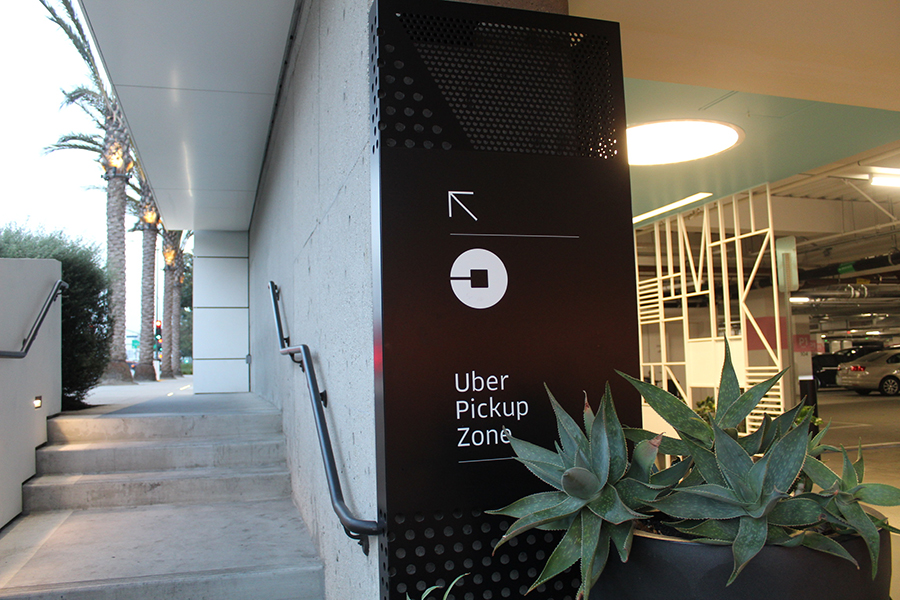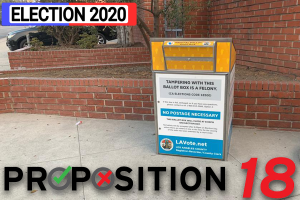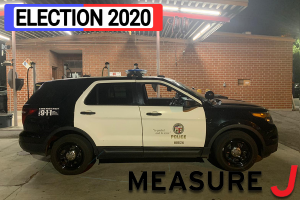Prop. 22: In fight over rules, voters will decide app drivers’ future
PICKUP: An Uber Pickup Zone at Westfield Century City Mall.
November 2, 2020
Editor’s Note: On Tuesday Nov. 3, Proposition 22 passed, with 59% of voters supporting the proposition and 41% opposed.
Independent contractors or employees?
That is the decision that Californians will have to make when they vote on Nov. 3 on Proposition 22.
Proposition 22, if passed, would exempt Uber, Lyft, and Doordash, among other app-based companies, from having to comply with a law called AB5, which went into effect Jan. 1, and mandates app-based drivers to be classified as employees, not independent contractors.
AB5 was passed after failed efforts to find a compromise between the companies and advocates for workers’ rights — so the measure asks the voters to take sides. The proposition on the ballot presents a choice between a wide range of driver benefits and protections and, on the other side, the work flexibility those same drivers love.
Mati Hurwitz, a Shalhevet and UCLA alum who drives for Postmates and DoorDash as a side job, said that he voted yes on Prop. 22 because he prefers to run on his own schedule and not have to be tied to a single company that’s not his full-time job.
“The sort of essence of being an independent contractor is eliminated with a vote no,” said Mati. “I want flexibility. I don’t want predetermined hours of work or a quota to fill.
“The great thing about picking up a side hustle is it’s a side hustle. You can just drop in drop out whenever.”
But Michael Robinson, a Lyft driver and organizer for Mobile Workers Alliance, said they won’t lose their flexibility and that app-based companies are trying to scare them.
“The whole thing is a myth about flexibility to scare the drivers,” said Mr. Robinson. “There has to be flexibility, because it’s not constant work.”
He believes the companies just don’t want to have to pay for benefits.
“They are trying to change the law to make it in their favor in order to take advantage of their drivers,” Mr. Robinson said, and hoping to avoid paying for worker benefits.
If Prop. 22 passes, he said, to get the benefits it promises drivers would have to work at least 15 hours a week. He said that given they are only paid for their “engaged time” — that is, when they are driving to pick up confirmed passengers and taking them to their destination — they would basically have to work full time, which defeats the purpose of being an independent contractor in the first place.
“They are not accounting for the time that our car has to be cleaned…now our car has to be disinfected…you are not…reimbursed for those cleaning supplies,” Mr. Robinson said.
He wishes that drivers who support Prop 22 understood how hard they would have to work if they wanted their benefits.
“I wish they knew…what the circumstances are, what’s required, to get those benefits that [they believe] they’re going to get…they’re going to have to work full time,” he expressed.
AB5 set new standards for all workers — not only for app-based drivers — as to who may and may not be considered an independent contractor. Independent contractors are people who work for themselves, perhaps providing services to several different companies, usually do not work full time at one company, and who do not carry out the company’s main purpose.
Employees of individual companies, however, are entitled to a long list of worker protections and benefits. These include health insurance, on-the-job accident protection, and protections against various kinds of discrimination and harassment covered by state and federal laws.
These laws do not generally apply to independent contractors.
Earlier this year, the San Francisco County Superior Court ruled that app-based drivers could not be classified as independent contractors under AB5 and would have to be made into employees.
Uber and Lyft responded by threatening to stop operating in California unless the court delayed the effective date of the ruling until they could appeal the decision to a higher court.
Meanwhile, they have spent, according to the Los Angeles Times, almost $2 million to create and advertise Prop. 22 to override that court decision. On Nov. 3, voters have a chance to take sides.
The companies insist that only by passing it will drivers retain their freedom to set their own hours.
They also say that if the proposition fails, they will leave the state.
Currently, the drivers continue to work without resolution of whether and when they will need to be converted into employees.
In addition to drivers and their customers, restaurants might also be affected by the outcome. They rely on companies like DoorDash, Postmates, and GrubHub — especially now, when more people are staying home more due to Covid19.
If it does pass, fulltime drivers would be paid up to 120% of the minimum wage of California (currently $13 per hour) or higher minimum wage rates imposed by local laws (for example, $15 per hour in Los Angeles County) They’d also receive accident insurance, reimbursements for driving-related expenses, and protection against discrimination and sexual harassment.
Drivers who have customers between 15 and 25 hours per week would receive a healthcare subsidy amounting to 41% of the average Covered California premium. Those working at least 25 hours per week would get a higher subsidy, 82%.
If the proposition fails, the companies have threatened to leave the California market.
Drivers are not the only ones who would be affected by Prop. 22. Closer to home, Dan Messinger, owner of BiBi’s Bakery and Cafe’, explained that his business relies on Postmates, and companies like them, to reach their customers.
“These app-based delivery services have been great in… allowing us to offer delivery in a way that we couldn’t before,” said Mr. Messinger, who is the father of freshman Max Messinger. “I could never afford a fleet of drivers that would let me do three or four or five deliveries at the same time…They are a blessing.”
Charlie Carnow, a researcher for the hospitality workers union Unite Here, said Prop. 22 was written only with the interests of the companies in mind, and not the drivers or their customers.
He said that, according to a UC Berkeley publication, under Prop 22 drivers would realistically only be making an hourly rate of $5.64, after taking into account the time the driver is waiting, along with “under-reimbursed” costs that come with owning and driving a vehicle, fixed healthcare costs, and the cost of payroll taxes and the value of employee benefits.
Mr. Carnow also worries that if it passes, Prop. 22 will become a model for other companies to use to get themselves exempted from protecting their workers.
“It’s not just a threat to rideshare drivers, but it’s a threat to everybody,” Mr. Carnow said. “All of our work could become… unsecured, contingent work, where we don’t have any of the benefits or the rights that people have fought for.”
He said that the companies’ actions amount to trying to buy their way out of having to give workers rights that the State Legislature had approved.
“We can’t let huge corporations buy our votes and write the rules for themselves,” said Mr. Carnow, “We have to protect workers.”
Whether Prop. 22 would help or hurt app-based drivers depends on who you ask. According to media reports, Prop. 22 is funded heavily by the companies that want to be exempted, along with other app-based companies such as Postmates and InstaCart, who are all hoping not to have to comply.
It also continues to say they’ll lose their flexibility.
On a “Yes On 22” Facebook live stream on Oct. 23, Marcel Hawkins, a driver for DoorDash in California, said on the live stream that he lives with his great-grandmother, and one day he got a call from her, saying that she had fallen on the floor.
Because he is an independent contractor, he was able to stop what he was doing and go help her get up.
“Having this flexibility has helped me out tremendously…I wouldn’t have been able to be there for her,” Marcel said.
The Yes On 22 campaign says drivers want to stay independent contractors rather than becoming employees by a 4-to-1 margin.
“More than 80% of drivers work less than 20 hours a week, have other jobs or responsibilities, and can’t work set shifts as employees,” the Yes On 22 website advertises.[related title=”Related Stories” stories=”38507,38525″ align=”center” background=”off” border=”all” shado
Joshua Gamson contributed to this story.

















Paul Soroudi, Los Angeles • Nov 3, 2020 at 6:24 am
Appreciate the well balanced article. The author thoughtfully presented both sides.